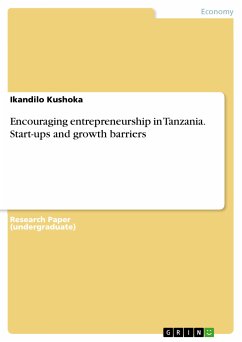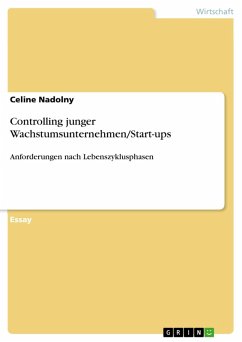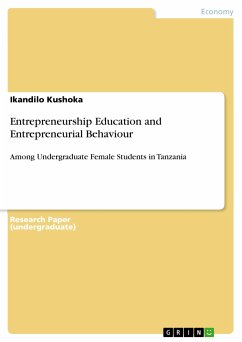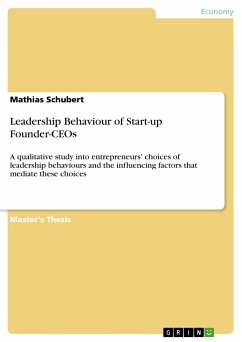
Encouraging entrepreneurship in Tanzania. Start-ups and growth barriers (eBook, PDF)
Versandkostenfrei!
Sofort per Download lieferbar
Statt: 52,95 €**
39,99 €
inkl. MwSt. und vom Verlag festgesetzt.
**Preis der gedruckten Ausgabe (Broschiertes Buch)
Alle Infos zum eBook verschenkenWeitere Ausgaben:

PAYBACK Punkte
0 °P sammeln!
Research Paper (undergraduate) from the year 2008 in the subject Business economics - Business Management, Corporate Governance, Institute of Accountancy Arusha, course: Entrepreneurship, language: English, abstract: This research study evolved in response to my desire to find out more about the issues of young entrepreneurs. In particular, it discusses what triggers them to form business ideas, how they enter into business, the barriers they face and ways to overcome these barriers. The researcher used descriptive design, a sample of 385 respondents was used to select respondents; the researc...
Research Paper (undergraduate) from the year 2008 in the subject Business economics - Business Management, Corporate Governance, Institute of Accountancy Arusha, course: Entrepreneurship, language: English, abstract: This research study evolved in response to my desire to find out more about the issues of young entrepreneurs. In particular, it discusses what triggers them to form business ideas, how they enter into business, the barriers they face and ways to overcome these barriers. The researcher used descriptive design, a sample of 385 respondents was used to select respondents; the researcher also used simple random sampling techniques to select the respondents with the help of questionnaires which were used to collect the primary data. The data collected was analyzed using content analysis, descriptive statistics, cross tabulation and hypothesis testing .Content analysis was used to analyses the in depth interviews. For the survey questionnaires, descriptive statists and cross-tabulation were used to analyses the responses given by the prospective entrepreneurs. The data from the questionnaires was captured coded and exported to statistical programme for social science (SPSS) which was used for analysis. Based on study findings and an insight gained from theory, the study proposes some strategies for dealing with the barriers identified in the research. Since it has been found that young people in start-up or growth modes who require start-up financing or financing beyond their current capital are seriously restricted by their inability to obtain loans from financial institutions because they are unable to meet the loan conditions pertaining to security, the study proposes that private sectors dealing with entrepreneurship development and entrepreneurs' associations establish viable SACCOs. According to literature review, study objectives and study findings the researcher, recommended that the Business Council of Tanzania should lobby the policy makers to:- Formulate an immigration policy which favors the entry of entrepreneurs who would create jobs. A policy allowing Tanzanian entrepreneurs who emigrated and obtained citizenship in other countries to retain dual citizenship would be very attractive here because they now automatically forfeit their Tanzanian citizenship. It also recommends that the Business Council of Tanzania discuss with the University of Dar es Salaam Centre for Entrepreneurship Development (CED) the establishment of a program in retailing, which the council would be asked to sponsor. That would help to develop a retailing class of entrepreneurs.
Dieser Download kann aus rechtlichen Gründen nur mit Rechnungsadresse in A, B, BG, CY, CZ, D, DK, EW, E, FIN, F, GR, HR, H, IRL, I, LT, L, LR, M, NL, PL, P, R, S, SLO, SK ausgeliefert werden.













